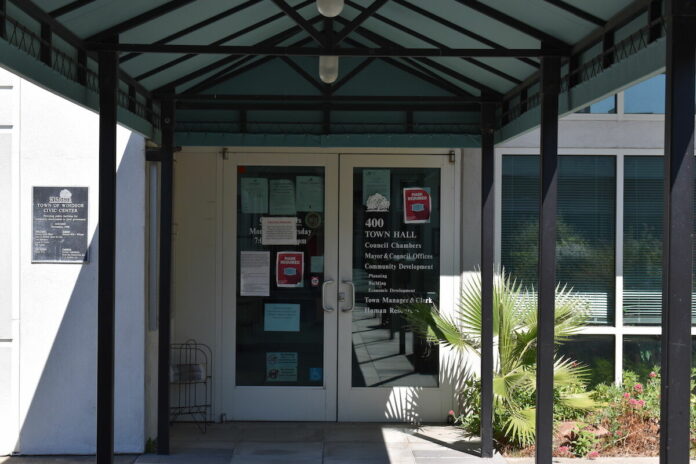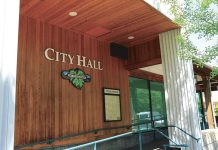The Windsor Town Council took a next step in developing a code of ethics to apply to elected and appointed officials at their Dec. 15 meeting.
According to Town Manager Ken MacNab, the item developed out of the frustration over the town council’s inability to take action against former mayor Dominic Foppoli following the sexual misconduct and assault allegations that shook the town last April.
“In the weeks following the revelation of the allegations last April the council was under tremendous pressure from the community to take punitive action against the former mayor. (Councilmembers) found that the council and the town had no adopted, formal standards and procedures for addressing misconduct, and ultimately the council took that and asked staff to go ahead and develop internal procedures for addressing instances of misconduct by elected officials — mostly the town council,” MacNab said.
After exploring options, city staff decided that the development of an ethics code would help close gaps between personal misconduct and existing laws that govern public service. As the town council found last spring, barring a criminal conviction, they are not able to remove a council member from office under any circumstances — even with the development of the ethics code.
What the code will do, according to MacNab, is establish a clearly defined set of aspirational values for officials to be held to, and then set up a set of policies and procedures for dealing with ethical complaints.
“Acting unethically does not always mean there’s a violation of the law, and therefore there’s no remedy necessarily under the law to address when there’s misconduct or someone is acting unethically. So really that’s what this ethics code is intended to address — it’s to fill that gap and provide council and the community with an understanding of what the expectations are for conduct and what the process will be for holding elected and appointed officials accountable when it’s been determined there is misconduct.”
Ultimately, the code of ethics will not give the council additional disciplinary options for its members, however, it will establish how the council investigates such claims and how current disciplinary actions available are taken.
The disciplinary actions council can take against its own members are public censure, removal from committees and, in extreme cases like with Foppoli, referral to the District Attorney’s Office and potential investigation by the Sonoma County Grand Jury. All potential criminal activity will still need to be referred to law enforcement, as the town council did with the Foppoli sexual assault allegations.
Christine Liz, a consultant with Regional Government Services, reported the results of a survey, which found, based on 215 responses, that the values most important to the Windsor community were integrity, transparency and accountability. The survey also found that Windsor respondents reported officials complying with the law and not using their office for personal benefit were the most important of four considerations for elected officials. Being held accountable for their actions by peers on the council, boards or commissions was second, and always acting in the public interest was third.
Betsy Mallace, who spoke during public comment, criticized the survey, which she said asked obvious questions, like the importance of complying with the law, which she said was a given.
“I guess my issue is it’s not ethics to comply with the law — it’s the law,” Mallace said.
Mayor Sam Salmon also criticized the part of the survey which asked respondents to rank 15 values including integrity, accountability and transparency, saying, “I can’t prioritize honesty versus transparency versus integrity. I’m supposed to prioritize those? Every one of those is a mandate to me.”
Salmon also worried that the ethical code could allow for spurious accusations from anyone off the street to trigger investigations and consequences for council members, although MacNab said this fear was overstated.
With the development of specific procedures to come at a future meeting, the council’s discussion primarily revolved around how ethical investigations by the council would work in tandem with law enforcement investigations.
Vice Mayor Esther Lemus, as a former criminal prosecutor, expressed a need to clarify with the public that referral by the council of the Foppoli case to state investigators was the correct course of action, although it brought criticism on a council the public viewed as unwilling to take action.
“Something that I want to say publicly because I think the public needs to here this is, back to this point about investigating internally versus referring to law enforcement, based on my experience in law enforcement as a criminal prosecutor I was very very aware of how criminal investigations take place and the risk that can happen when you have dual investigations investigating criminal activity,” she said.
Lemus said referring the case to law enforcement as the council did was the correct course of action given the criminal nature of the allegations, and criticized members of the press who she said had said the town council did nothing in response to the Foppoli scandal.
MacNab said the council would not be expected to investigate criminal activity on its own, only conduct alleged to have violated the ethical standards established.
“I’m not sure the council has the skills, talent and sensitivities required when carrying out its own investigation of the law,” MacNab said.
MacNab also clarified that having an all-inclusive ethics code, even with some obvious tenants, was necessary because it would clearly establish expectations of officials.
Councilmember Debora Fudge said the ethics code was another example of the young town adding to its code as circumstances have demanded.
“You can’t predict everything you need, but we’ve been tightening things up and adding more things for the last few years out of necessity,” she said.
Fudge also said Windsor’s ethics code could serve as a model for other municipalities in Sonoma County.
“I’m excited to get to the next step. This is something I think will help other towns and cities as well, because so many things come up. We definitely want the public to know that we have our eye on it and we have procedures to follow,” she said.
City staff will prepare a draft set of statements defining ethical review for a future meeting, when council members will discuss how exactly to address instances of misconduct, including how to engage potentially criminal activity.









